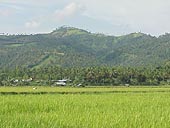|
| Baao, Camarines Sur, Philippines | |
|
Undistracted by war, agricultural productivity started to recover. Coconuts were again being processed into copra. Abaca or Manila hemp was being exported again. Logging in the remaining forests of Baao resumed. Massive titling of public lands also occurred especially during the post-war Commonwealth government. The timberlands of Baao were not spared. Lowlanders started settling in the uplands. The indigenous mountain people of Baao, the Agtas, were crowded out of the more productive uplands leaving them to subsist on small marginal areas. Timid and illiterate, they were not able to stem the massive land grabbing of their ancestral lands by lowlanders. The influence of lowland culture also took its toll on their way of life. Alcoholism, mendicancy and indolence became rife. The once proud hunter-warriors of the Baao hills were reduced to pitiful and scraggly group of people trying to preserve their culture and their very lives. In the late 1950's and early 1960's, a series of territorial disputes arose between Baao and the municipalities of Bula and Ocampo and the city of Iriga. Portions of Lake Baao, the Union Agricula y Pecuaria and parts of San Rafael, Agdangan and Sta. Teresita and San Francisco were being claimed by Bula. Ocampo claimed portions of Tapul, Iyagan and Santa Isabel. Meanwhile, Iriga City was also claiming parts of Pugay and Nababarera. There came even a time when police forces from the two disputing towns of Baao and Bula exchanged volleys of gunfire. All these disputes were said to be under litigation during previous administrations but the townspeople are yet to see concrete gains from these efforts. The Marcos Era In the early years of the Marcos presidency, Baao was a relatively peaceful town. It may have not been as progressive as its neighboring towns but the people were content to live life in simple drudgery. Farming and fishing were still the people's main livelihoods. National and local politics was one of their major sources of amusement. But already the veneer of peacefulness of Baao is slowly being broken in the late 1960's as it was in Manila. Unemployment was running high. Politics was getting dirtier; governance, more corrupt and inept; national and local economy, on a slump. Lawlessness was becoming the rule of the day. Poverty was everywhere except in Malacaņang and the home of the oligarchs. Already some Baao youths were agitating for change. A social volcano was about to erupt.
|
|
|
|



